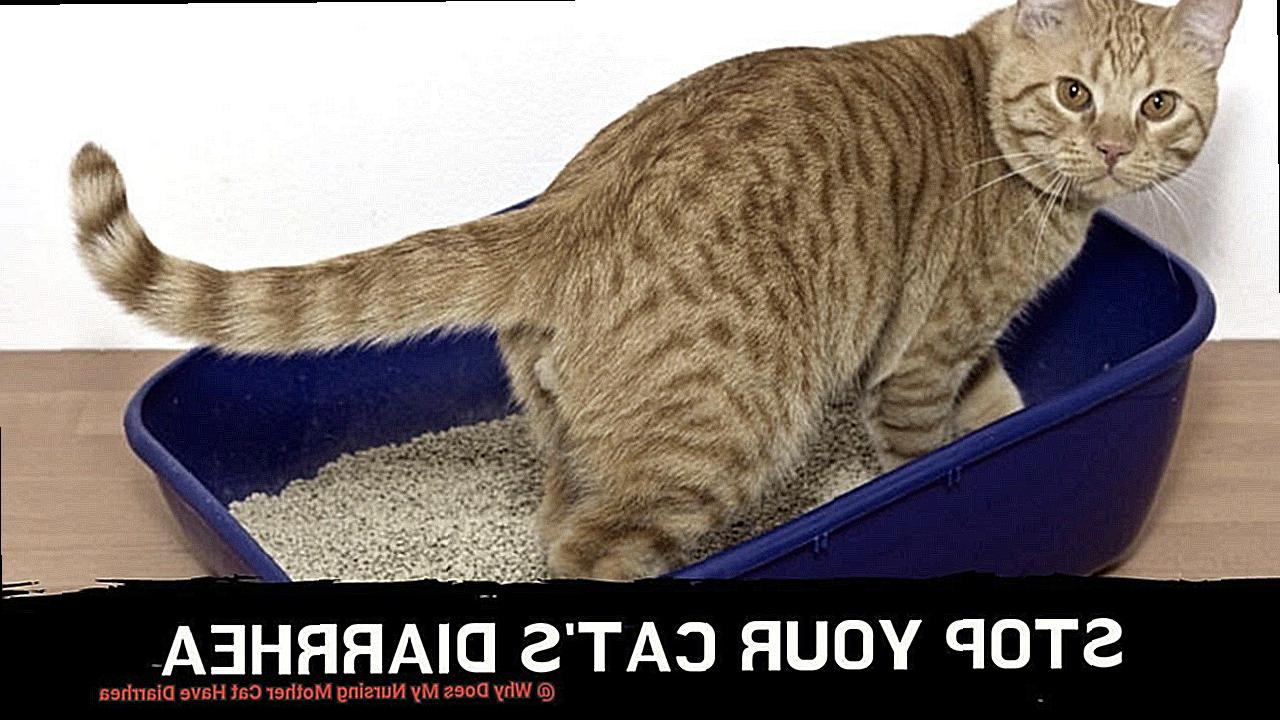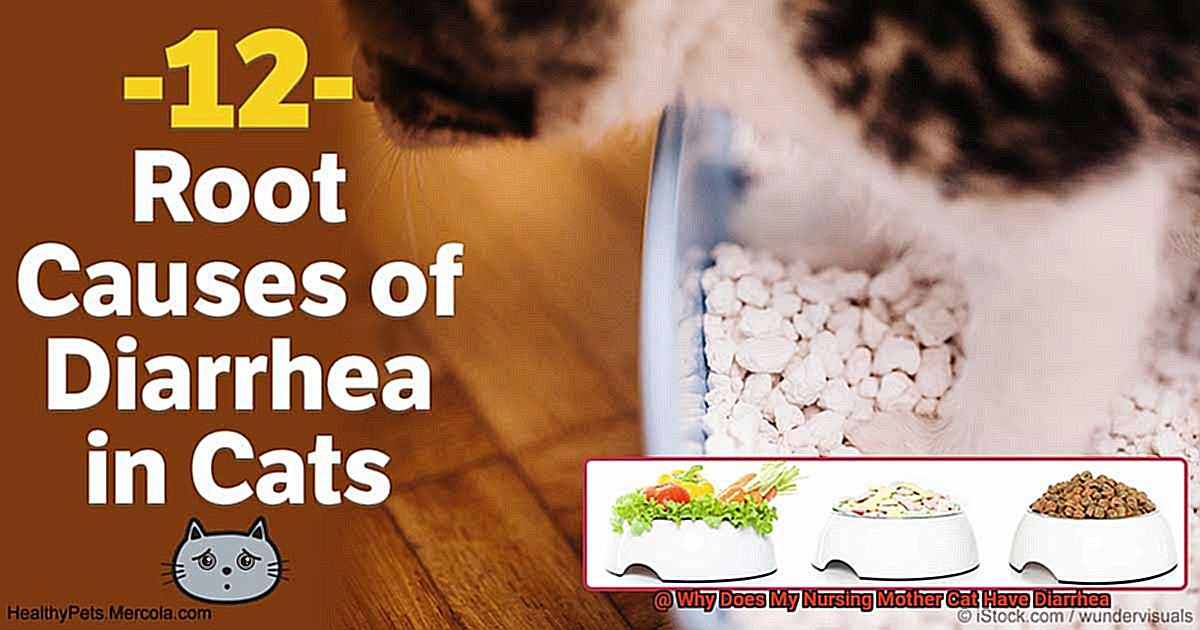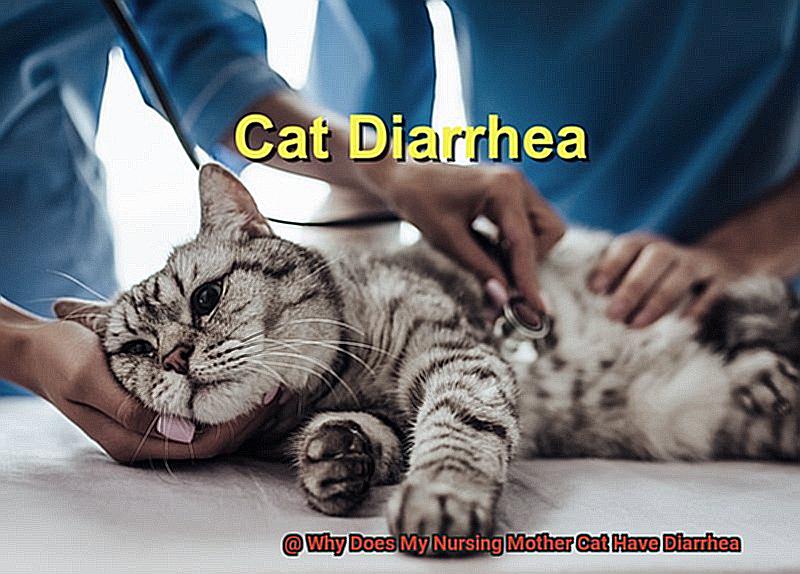As a cat owner, you know that nursing mother cats are incredibly protective of their kittens. They will go to great lengths to ensure that their little ones are healthy and thriving. However, if you notice that your nursing mother cat has diarrhea, it can be alarming and concerning.
Diarrhea is not only uncomfortable for your cat, but it can also be a sign of an underlying health issue. As a responsible pet parent, it’s crucial to understand the reasons why your cat may be experiencing this condition.
In this blog post, we’ll dive into the various causes of feline diarrhea in nursing mother cats. We’ll explore how changes in diet or introducing new types of food can cause digestive issues for cats with sensitive stomachs. We’ll also discuss how infections and parasites such as worms can lead to diarrhea.

It’s essential to take prompt action when dealing with diarrhea in nursing mother cats. By understanding why your cat is unwell, you can take the necessary measures to ensure both she and her kittens remain healthy.
Our expert tips will provide you with practical solutions on how to manage this condition. We’ll detail ways to care for your nursing mother cat and her kittens while ensuring they receive proper nutrition and medical attention.
So if you’re looking for valuable insights on why your nursing mother cat has diarrhea and how best to address it, keep reading.
What Causes Diarrhea in Nursing Mother Cats?
Diarrhea can be caused by various factors, including stress, diet, infections, or medications. In this article, we will explore the different reasons why nursing mother cats may develop diarrhea and what you can do to help.
One of the most common culprits of diarrhea in nursing mother cats is stress. Cats are sensitive animals, and any changes in their environment can trigger stress, leading to digestive issues. Moving to a new home or introducing new pets or people into the household can be a potential source of stress for your nursing mother cat.

Another factor that can cause diarrhea in nursing mother cats is a change in their diet. Nursing mother cats require a specific type of diet that provides them with the necessary nutrients to produce milk for their kittens. Any sudden change in their food can upset their stomach and lead to diarrhea.
Infections such as bacterial or viral infections can also cause diarrhea in nursing mother cats. Kittens have an underdeveloped immune system, making them more susceptible to infections. Nursing mother cats can easily contract these infections while caring for their kittens, leading to diarrhea.
Stressful situations like weaning kittens can also contribute to digestive issues in nursing mother cats. Weaning kittens is a significant life event for both the mother cat and her kittens, and it can be a stressful experience that leads to diarrhea.
It is vital to address the underlying cause of diarrhea in nursing mother cats promptly. If left untreated, diarrhea can lead to dehydration and malnutrition, which could be life-threatening for both the mother cat and her kittens. It is advisable to consult a veterinarian if your nursing mother cat experiences diarrhea for more than 24 hours or displays other concerning symptoms.
Diarrhea in nursing mother cats can be caused by various factors such as stress, changes in diet, infections, or medications. By understanding these causes, we can take the necessary steps to prevent and treat diarrhea in our furry friends.
Remember to provide your nursing mother cat with a high-quality, balanced diet, and minimize any potential sources of stress in her environment.
Stress as a Cause of Diarrhea in Nursing Mother Cats
Cats, like humans, can experience stress that can lead to various health problems, including digestive issues.
Stressful events for cats can range from changes in their environment, such as moving to a new home or the introduction of a new pet or person into the household, to loud noises and sudden changes in routine. Nursing mother cats may also experience stress due to the demands of caring for their kittens, which can be physically and emotionally taxing.
When a cat experiences stress, it disrupts its digestive system, leading to diarrhea. This means that if your nursing mother cat is under stress, she may suffer from diarrhea.
The good news is that there are steps you can take to minimize your cat’s stress levels and prevent diarrhea. Start by providing a quiet and secure environment for the mother and her kittens. Ensure they have access to plenty of clean water and food, and try to maintain a consistent routine as much as possible.
In some cases, medication may be necessary to alleviate stress-related diarrhea in nursing mother cats. However, it is essential to consult with a veterinarian before administering any medication, as some treatments may be harmful to nursing kittens.
If your nursing mother cat is experiencing diarrhea, it is crucial to address the underlying cause promptly before it leads to dehydration and malnutrition. By minimizing stress levels and providing proper care and treatment, you can help your cat recover from this uncomfortable condition and keep her healthy for years to come.
Remember, as a responsible cat owner, monitoring your nursing mother cat for signs of stress is crucial.
Diet Changes and Diarrhea in Nursing Mother Cats

Being a nursing mother cat is a demanding job, and dealing with diarrhea can make it even tougher. But don’t worry, there are some simple solutions to get you back on track.
It’s important to understand that changes in diet can be the root cause of diarrhea. A sudden switch to a new food brand, type, or the consumption of inappropriate foods like table scraps or spoiled food can upset your digestive system.
As a nursing mother cat, your dietary requirements are unique. You need more calories, protein, and fat than non-nursing cats to support lactation and meet your nutritional needs. Gradual dietary changes over several days can help your digestive system adjust.
But that’s not all – access to clean water is equally vital. Dehydration can worsen diarrhea and lead to severe health complications. Your owner should provide fresh water in multiple locations throughout the house to encourage you to drink more.
If your diarrhea persists despite these measures, it’s time to consult with a veterinarian. They can run diagnostic tests and recommend appropriate treatment options to address the underlying cause of the diarrhea and prevent dehydration.
As a nursing mother cat, you don’t have to suffer through diarrhea alone. With gradual dietary changes and access to clean water, you’ll be back to feeling like yourself in no time.
Underlying Health Conditions and Diarrhea in Nursing Mother Cats
Your priority is always to keep your kittens healthy and thriving. However, sometimes unexpected health issues can throw a wrench in your plans.
One such issue is diarrhea, which can be caused by various underlying health conditions.
Bacterial or viral infections are common culprits of diarrhea in nursing mother cats. These infections can easily occur when you come into contact with contaminated food, water, or feces.
Salmonella and E. coli are two types of bacterial infections that can wreak havoc on your digestive system, while viral infections like feline distemper and feline coronavirus can also lead to diarrhea.
Parasitic infestations are another possible cause of diarrhea. Roundworms, tapeworms, and giardia are pesky parasites that can live in your intestines and cause irritation and inflammation, leading to diarrhea.
Inflammatory bowel disease is a chronic condition that can affect the digestive system of cats, including nursing mother cats. This disease causes inflammation and damage to the lining of the intestines, leading to diarrhea, vomiting, weight loss, poor appetite, and lethargy.
Food allergies or intolerances can also trigger diarrhea in nursing mother cats. If you develop an allergy or intolerance to certain ingredients in your food, it can cause gastrointestinal upset and diarrhea. To avoid this issue, it’s best to steer clear of any foods that upset your stomach.
Lastly, medication side effects can also cause diarrhea in nursing mother cats. For example, antibiotics can disrupt the natural balance of bacteria in your gut, leading to diarrhea.
If you notice any signs of diarrhea or other gastrointestinal problems, it’s essential to seek veterinary care right away. Your vet will be able to identify the underlying health condition and provide appropriate treatment, such as medication or a change in diet.
In conclusion, as a nursing mother cat, you play a vital role in the health and well-being of your kittens. Knowing the causes and signs of diarrhea can help you take better care of yourself, so you can continue to be a superhero for your litter. Stay hydrated, avoid spoiled food, and seek veterinary care if you experience any digestive issues.
Medications and Diarrhea in Nursing Mother Cats
You’re naturally concerned with the health and safety of your kittens. Unfortunately, diarrhea can occur, especially if you’re taking medications. It’s essential to consider any medication you’re taking as certain drugs can cause diarrhea in nursing mother cats, including antibiotics, anti-inflammatory drugs like aspirin or ibuprofen, and some heart medications.
Antibiotics, for instance, can disrupt the natural balance of bacteria in the gut and lead to digestive issues. If you suspect that medication is causing your cat’s diarrhea, it’s vital to consult your veterinarian.
They can determine if the medication is safe for your nursing mother cat and her young ones. In some cases, they may need to adjust the dosage or switch to another medication that won’t upset your cat’s digestive system.
It’s also important to be aware that some medications can be passed from the mother cat to her kittens through breast milk. This can cause health problems for the kittens, so it’s critical to inform your veterinarian if your nursing mother cat is taking any medications. They’ll provide guidance on how to proceed to ensure both the mother cat and her kittens stay healthy.
If your nursing mother cat develops diarrhea while taking medication, it may be necessary to temporarily stop nursing the kittens until the diarrhea is under control. This will prevent them from becoming sick as well.
In conclusion, while medications can be beneficial in treating illnesses, they can also cause diarrhea in nursing mother cats.
To avoid potential risks, it’s crucial to always consult with a veterinarian before giving any medication to a nursing mother cat and inform them if she is already taking any medications.
By working closely with your vet, you can help ensure the health and well-being of your nursing mother cat and her litter.
The Dangers of Untreated Diarrhea in Nursing Mother Cats
Diarrhea is a symptom of an underlying issue, and if left untreated, it can lead to severe consequences such as dehydration, malnutrition, and even death.
The demands of caring for their kittens already put nursing mother cats under significant stress. Diarrhea can exacerbate this stress and weaken their immune system, making them more vulnerable to other illnesses. This is why it’s essential to seek veterinary care immediately.
Dehydration is one of the most significant dangers of untreated diarrhea in nursing mother cats. The loss of fluids and essential electrolytes due to diarrhea can lead to dehydration. Nursing mother cats require more fluids to produce milk for their kittens, making dehydration especially dangerous for them.
Untreated diarrhea can also lead to malnutrition in nursing mother cats. The loss of essential nutrients through diarrhea can result in malnourishment. Proper nutrition is essential for nursing mother cats to produce milk and care for their kittens. If they become malnourished, their milk production may decrease, and their kittens will suffer.
Moreover, untreated diarrhea can spread infections throughout the litter. Diarrhea can contain harmful bacteria and viruses that can spread from one kitten to another if not treated promptly. This can put all the kittens at risk and lead to a serious outbreak of illness within the litter.
Diarrhea in nursing mother cats should never be overlooked. Seeking veterinary care immediately is crucial as the dangers of untreated diarrhea are severe and can lead to long-term health issues for both the mother cat and her kittens.
XCyVaimWR0g” >
Conclusion
In conclusion, diarrhea is no laughing matter for nursing mother cats. As a responsible and loving pet owner, it’s crucial to understand the various causes of feline diarrhea and take necessary measures to prevent and treat it. Stress, diet changes, infections, parasites, and medication side effects are some of the leading culprits behind your cat’s upset tummy.
To keep your nursing mother cat healthy and happy, it’s essential to address the underlying cause of diarrhea promptly. Failure to do so can lead to dehydration, malnutrition, and even spread infections throughout the litter. By providing your furry friend with proper nutrition, access to clean water, and a stress-free environment, you’re already taking the right steps towards preventing diarrhea.
However, if you notice any signs of diarrhea or other gastrointestinal problems in your nursing mother cat – don’t hesitate. Seek veterinary care immediately. Your trusted vet will be able to identify the underlying health condition and provide appropriate treatment.
Remember that as a nursing mother cat, your priority is always to keep your kittens healthy and thriving. But this doesn’t mean neglecting yourself. By taking good care of yourself and seeking veterinary care when necessary – you can ensure that both you and your kittens remain happy and healthy for years to come.







